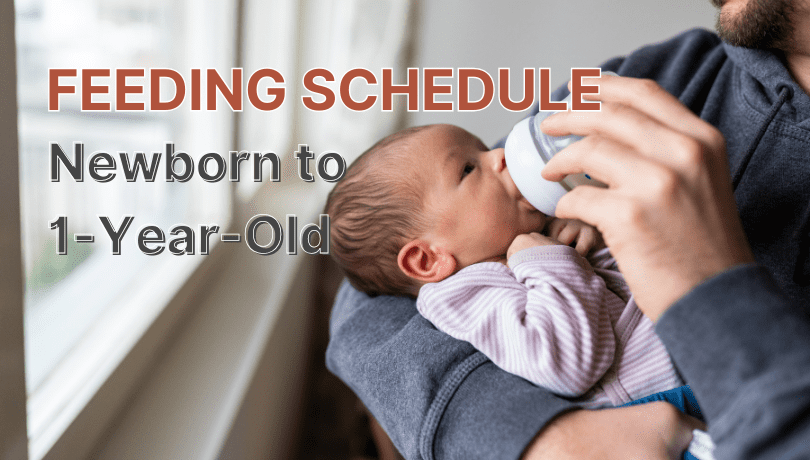Newborn to 1 Year Old Feeding Schedule: A Full Guide
Hey, dear parents, have you been working on getting your little one on a proper schedule lately? Or still struggling to figure out whether your baby is eating well or not?
Being a mother to six kids, I understand what it takes to develop a good feeding schedule for them. During their initial few weeks, babies are completely dependent on milk feeding, and they transition right after a few months. So, their feeding schedules keep changing with their development. A 1 year old feeding schedule will be way different from a 6-week-old’s.
When I was a new mom, I was always concerned about the feed – is the milk enough for the baby? Am I timing it right? And the list never ends. Maybe you’re feeling the same way as a new mom yourself.
So, to ease your doubts about feeding, I have summed up a few feeding schedules according to age. Hope you find it useful! Let’s take a look.

Table of Contents
6 Week Old’s Feeding Schedule
With a newborn, the size of their stomach is still small, so, they need a feed after every few hours.
However, as they reach 6 weeks, you will naturally start noticing changes in their feeding pattern. With my baby, Theo, his demand for milk increased at 6 weeks. At the same time, the number of times he fed in a day reduced little by little.

So, here’s a schedule for the 6-week-old mark –
- Breast Milk: Approx. 3 ounces every 2–3 hours.
- Formula Milk: Approx. 5 ounces every 4 hours.
Please try to stick to the schedule and know that your little one will also demand milk when it’s past time.
Recommended Reading: Mixing Formula and Breast Milk
- Also, get ready for cluster feeding at this stage. Your baby will demand more milk, and it will take longer to fill up their tummy.
- For breastfeeding mothers, your milk supply will increase at this stage, but slowly, you will be able to ease out of leaky and full breasts.
8 Week Old’s Feeding Schedule
As babies grow, their demand for milk will eventually increase. Now that your baby has turned 8 weeks old, you must be prepared for a stretched feed. They will demand more and won’t leave until their tummies are full.

- At 8 weeks old, your baby is expected to consume 4–5 ounces per feed.
But, there’s good news. Now, your baby gets a full tummy before bedtime and they will sleep longer. Theo hardly woke up during the night at 8 weeks old. He slept for long stretches. I was very relieved, and it allowed me enough time to get a good night’s sleep.
7-Month-Old’s Feeding Schedule
This is finally the time for transition. When Theo turned 6 months old, I introduced him to solids. I also introduced him to his first sippy cup at this phase.
This is the time when your little one will be all set to experiment. However, also note that your babies are small right now. They will still be majorly on milk feed. Solids will be a part of their experimentation and exposure to develop taste buds.

I’ve created a schedule that syncs well for a 7-month-old:
| Time | Feed |
|---|---|
| 7:00 AM | Milk |
| 8:00 AM | Solid food [mashed fruits: banana, avocado, etc.] |
| 10:00 AM | Bottle of milk |
| 10:15 AM – 12:00 PM [Bath and Play] | |
| 12:15 PM | Bottle of milk and a nap |
| 2:00 PM | Solid food [mashed potatoes, soft veggies, etc.] |
| 4:30 PM | Bottle of milk and a short nap |
| 6:00 PM | Solid food [boiled eggs, chicken/veg stock, etc.] |
| 8:00 PM | Milk and bedtime |
By the time Theo turned 6 months old, the baby bottle became familiar to him. And at 7 months, I began giving him a cup of water now and then.
Also, try giving your little one different types of solids at least 2–3 times a day.
Suggested Solids for a 7-Month-Old
- Boiled and mashed vegetables or chicken
- Boiled eggs
- Yogurt
- Grated cheese/tofu
- Mashed fresh fruits [banana, apple, papaya, and other seasonal fruits]
9-Month-Old’s Feeding Schedule
At 9 months old, the milk feeds reduce, and ideally, your baby is now comfortable eating solids.
When Theo turned 9 months old, his naps dropped to just two in a day. He used to stay awake for almost 3 hours and actively play around. So, I would try giving him at least 3 solid meals a day.

Also, even if your baby is eating solid foods well, don’t skip breast milk or formula just yet. For babies, milk is the ultimate source of nutrition, at least until one year.
Recommended Reading: Advantages and Disadvantages of Breastfeeding after 2 Years
Here’s a feeding schedule you can follow for a 9-month-old:
| Time | Feed |
|---|---|
| 7:00 AM | Milk |
| 8:00 AM | Solid food [Mashed fruits: banana, avocado, etc.] |
| 10:30 AM | Bottle of milk |
| 11:00 AM – 12:00 PM [Bath and Play] | |
| 12:15 PM | Bottle of milk and a nap |
| 2:00 PM | Solid food [Mashed potatoes, veggies, etc.] |
| 4:00 PM | Bottle of milk |
| 6:30 PM | Solid food [chicken or veg puree, lentils, etc.] |
| 8:00 PM | Milk and bedtime |
At 9 months, babies usually begin teething and learn to chew. If you are still providing them with more liquid foods, offer boiled vegetables or other solids to make them chew. Trust me, they will love it and in no time they will start with purées.
1 Year Old Feeding Schedule
Mothers, as your child turns one, you have to be prepared with a meal plan that is rich in protein, carbs, vitamins, and other nutrients.

When Theo turned one, I ensured that I fed him every 2–3 hours. He ate at least 3 meals a day, accompanied by 2 snacks. I also experimented with plenty of different foods because their taste buds change!
I have summed up a schedule that I follow. Take a look:
| Time | Feed |
|---|---|
| 7:00 AM | Milk |
| 8:00 AM | Fruits [Bananas, apples, oranges, etc.] |
| 10:00 AM | Breakfast – Whole grain bread with peanut butter, scrambled eggs, etc. |
| 12:00 PM | Snacks [Whole grain crackers, chips, cheese sticks] |
| 2:00 PM | Lunch – Vegetable purée, tortillas, steamed veggies, lentil soup, etc. |
| 4:30 PM | Milk |
| 6:30 PM | Snacks [Raspberries, Greek yogurt, bagel, etc.] |
| 8:00 PM | Dinner [Boiled eggs, cooked pasta, cooked chicken, sweet potato, etc.] |
| 8:30 PM | Milk and bedtime |
Children will have their routines changing as they develop. So, do not worry if you have been able to feed only 3 meals and missed out on snacks.
I called a dear friend of mine recently about feeding schedules. She said –
“My daughter’s nap schedule has been changing very regularly now. She usually misses out on snacks. When she wakes up in the morning, she is quite late sometimes. She ends up having lunch directly. Just stay calm and make sure that your baby is at least having 3 meals a day. That’s it”.
Milk Schedule for a 1-Year-Old
Even when your baby starts a solid diet, you need to ensure that they are being fed enough milk throughout the day (cow/goat or other milk, unless you’re vegan). Milk is the richest source of calcium, vitamins, and protein for babies.
I made sure that Theo at least had 2–3 cups of whole cow milk in a day. Babies who are fed less milk have a risk of different deficiencies.
Please consult your pediatrician on an appropriate nutrition schedule if your lifestyle or your child’s medical conditions do not allow the consumption of dairy products.
Combination Feeding Schedule
Some mothers choose combination feeding for their little ones. This works quite well, though – here, the mother offers both breast milk and formula milk to the baby. It has good advantages too:
- Super flexible and a lifesaver for parents
- High in nutritional value
- Provides the mother with some spare time to relax or rest
- Excellent choice for working mothers
Everything needs a schedule, though. A proper combination feeding schedule will help you feed your baby with ease and smooth the process. You should start your combination feeding early in the morning. Introduce it to your baby and let them adjust to the combination.
If you find yourself struggling with the feeding process, try changing the nipple. At times, nipples are either too hard or too wide for babies. Get them their perfect-sized nipple that makes the milk flow easily and smooth for the little one.
Takeaway on Feeding Schedules
Babies are highly dependent on a good diet for their development. So, mothers, please stick to the feeding schedules strictly but keep yourself open for experiments too. As your little one grows, there will be changes to their meal preferences.
Also, do not forget to add milk (cow milk or others) to their diet. And if you find yourself struggling with feeding or your baby has been rejecting the food, do not hesitate to consult your doctor.
Until then, happy parenting, guys.






